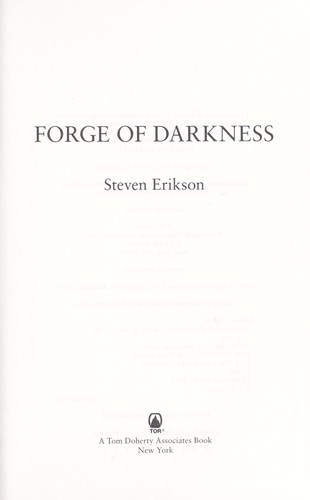Orlion reviewed Forge of darkness by Steven Erikson
Review of 'Forge of darkness' on 'Goodreads'
4 stars
Steven Erikson returns to the world he helped make in the ten book saga Malazan Book of the Fallen. It is a much earlier time and can be viewed as a prequel to that sequence. Unlike the vast majority of his previous series, this is not a self-contained novel, it is instead the first part in a trilogy.
Unique in the realm of prequels, this book can be read by fans of the other Malazan books or by readers new to the series. So I will try to articulate what both groups ought to expect from this tale of the Tiste.
For those unfamiliar with Erikson's previous work: Is this a good starting point? Sure. Erikson still does not write with the clarity inherent in blockbuster authors such as Martin or Jordan, and as such the uninitiated will always find their first encounter with Erikson to be one of befuddlement, head scratching, and a massive cast of characters that one would normally think would fit better in a longer work. Add to that a shift in style to the ponderous, and you have a challenging read ahead of you.
To be certain, the style is one that works and is necessary. Drawing from Shakespearean tropes, Erikson provides a refreshing take on political intrigue that, though as old as the Bard's works themselves, are mostly entirely missing in contemporary fantasy. Further, by adopting the often philosophical musing quality of Shakespearean dialogue, the Tiste are better established as a race separate from human in thought and culture. But with all the flowery prose, a lot is left below the prose. Motivations, reasoning, even some plot points are left for the reader to decode. I believe that this is possible, even if a re-read may be necessary. Ultimately, this book would provide the new Erikson reader with a confusing but eventually coherent narrative and the expectations one finds in a story only one-third told. This is probably more desirable than starting with Gardens of the Moon which provides a confusing, semi-coherent, complete narrative with nine books remaining to soldier through.
For those veteran readers of Erikson: This is a must read. Just by viewing the Dramatis Personae at the beginning of the novel, you will find that there are many familiar faces waiting. This creates a sort of exciting expectation as you wonder what information will be provided for these characters that have been withheld for so long. So, how many unanswered questions from the Fallen series are addressed? Are the mysterious natures of some of that series' most inscrutable characters expounded upon?
Eh.
To be sure, you will learn quite a bit. But that will not come close to filling the void of knowledge you want to be rid of. And that is fine, this is the first book of three, it is actually amazing how much illumination was in this one book.
But is it canon? This question will arise because in the prologue, the poet that is 'telling' the story makes comments to the extent that he is going to make stuff up. To those concerned about this "issue", calm down. Go outside. Enjoy life, add some color to that pasty white skin of yours. Leave the dank cold of your mother's basement and feel the warmth of the sun as UV radiation burns individual skin cells to death.
With that out of the way, it should be kept in mind that Erikson is going almost wholesale for a Shakespearean technique of telling this story. He only isn't using the rhyming scheme. And if you look at any Shakespearean play about historic events, you'll have a general outline of those events and scenes like Richard the III being a murderous hunchback, Joan of Arc delighting in being the tool of the devil, and any person associated with the Tudor line being a good guy.
Essentially, enjoy it for what it is: a story. One that probably has a purpose and that is the driver of the plot.

